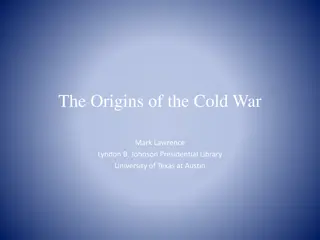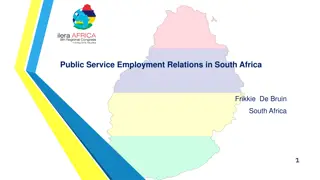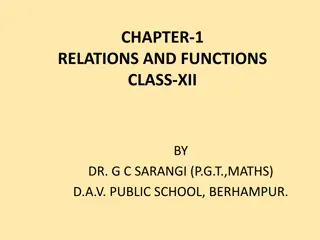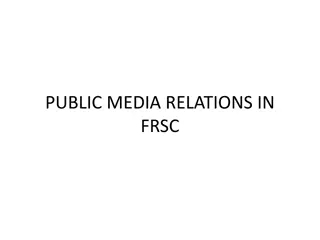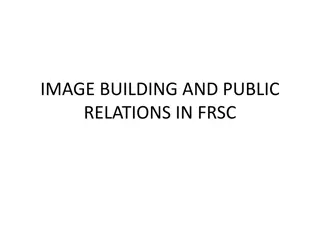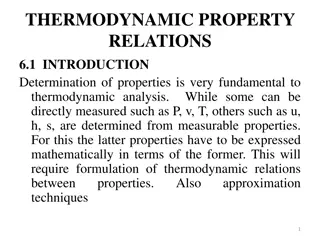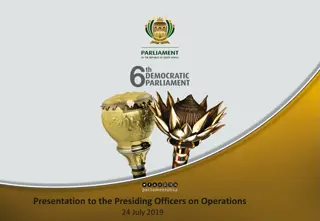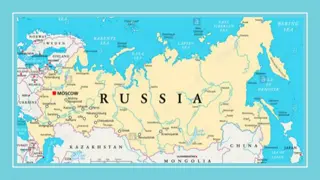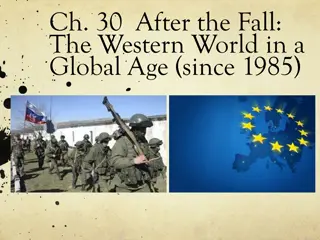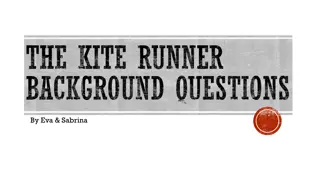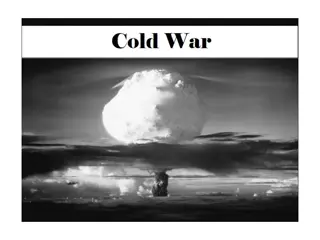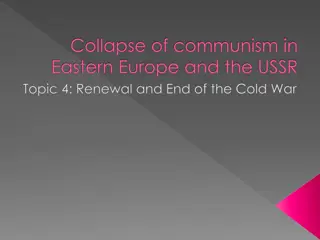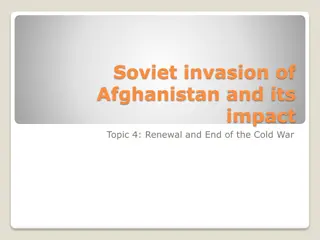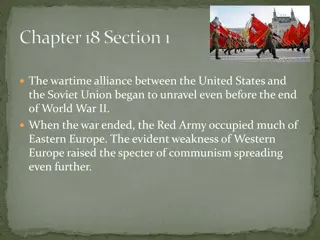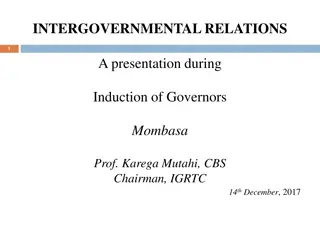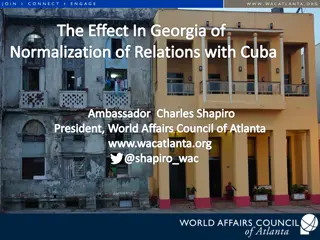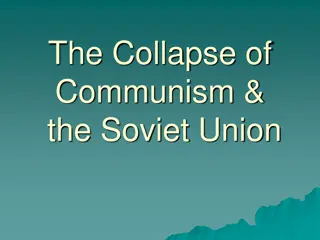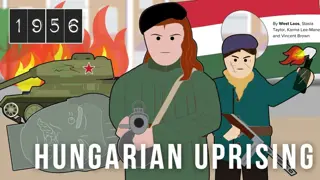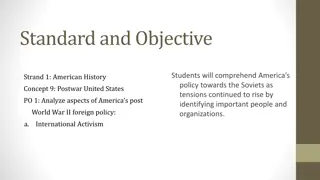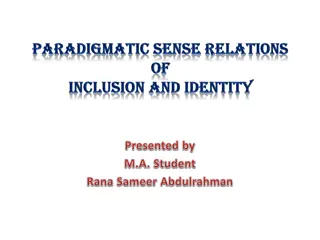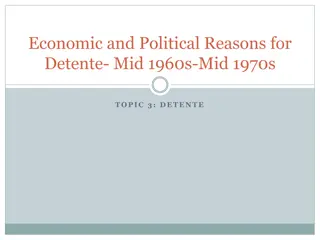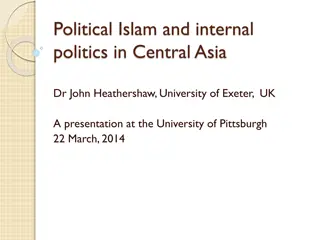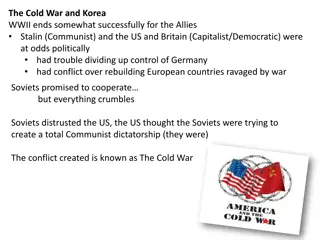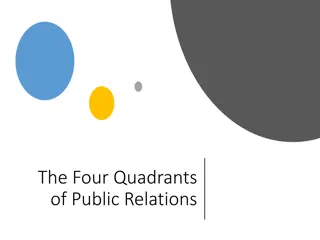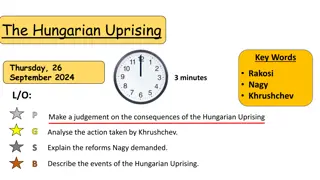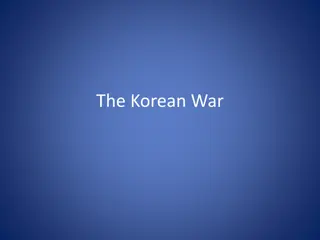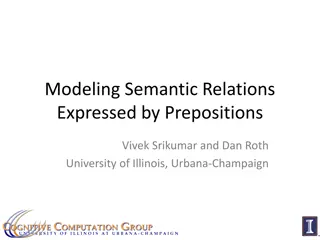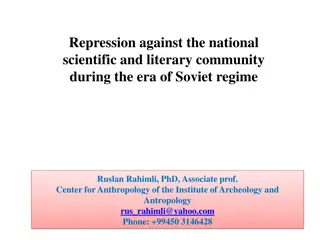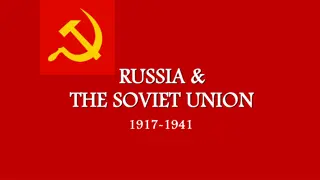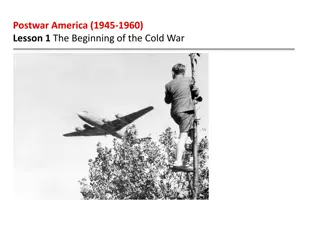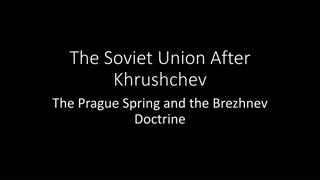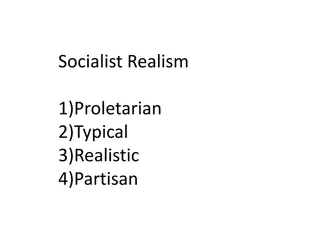Exploring Global Literary Radicalisms in the Soviet Era
The passage delves into the life of Margulies, detailing his meticulous routine and contemplation of time in the Soviet context. It reflects on themes of industrial progress, historical backwardness, and the intertwining of time and life. Additionally, it references Stalin's vision for economic adva
2 views • 18 slides
[PDF⚡READ❤ONLINE] Energiya-Buran: The Soviet Space Shuttle (Springer Praxis Book
\"COPY LINK HERE ; https:\/\/getpdf.readbooks.link\/0387698485\n\nDOWNLOAD\/PDF Energiya-Buran: The Soviet Space Shuttle (Springer Praxis Books) | Energiya-Buran: The Soviet Space Shuttle (Springer Praxis Books)\n\"\n
1 views • 6 slides
Researching at GARF: Accessing Soviet and Post-Soviet Documents
Explore the State Archive of the Russian Federation (GARF) for Soviet and post-Soviet documents accessible to both Russian and international researchers. Learn how to obtain a researcher pass, request materials, utilize electronic finding aids, and search for specific terms and files remotely. Disco
1 views • 16 slides
The Origins of the Cold War and U.S.-Soviet Antagonism
Amid post-World War II developments and contrasting ideologies, the Cold War emerged, marked by Yalta and Potsdam Conferences, the Truman Doctrine, the Marshall Plan, the Berlin Blockade, NATO's formation, and more. Various perspectives exist on the roots of U.S.-Soviet tensions, with the Soviet vis
1 views • 16 slides
Public Service Employment Relations in South Africa: Overview
The South African public service employment relations are governed by various acts including the Labour Relations Act, Basic Conditions of Employment Act, and others. The legal framework emphasizes collective bargaining, with the Public Service Coordinating Bargaining Council playing a key role. The
0 views • 17 slides
BSc in Strategic Studies & International Relations at KDU
The Faculty of Defence and Strategic Studies at KDU offers a hybrid BSc degree in Strategic Studies and International Relations to prepare skilled professionals in national security and foreign relations. The program aims to develop theoretical and research skills for analyzing international politic
0 views • 8 slides
Understanding Relations and Functions in Mathematics
This chapter explores various types of relations and functions, including empty and universal relations, equivalence relations, and common errors in understanding symmetry. It also delves into the concept of reflexivity, symmetry, and transitivity in relations, with practical examples provided for b
1 views • 16 slides
Public and Media Relations in FRSC
This presentation discusses the importance of maintaining healthy public and media relations in the Federal Road Safety Corps (FRSC) in Nigeria. It outlines the objectives, functions, and activities of public relations within the organization, emphasizing the need for effective communication and ima
2 views • 23 slides
Role of Public Relations in Image Building for FRSC
Explore the crucial role of effective public relations in enhancing the corporate image of the Federal Road Safety Corps (FRSC). The paper discusses the importance of public perception and how it influences FRSC's operations, alongside objectives such as defining public relations, highlighting the v
2 views • 19 slides
Fundamentals of Thermodynamic Property Relations
Determining thermodynamic properties is crucial for analysis, involving direct and derived properties expressed through formulations and relations. Partial derivatives, fundamental relations like the 1st and 2nd laws, and functions such as enthalpy, Helmholtz, and Gibbs are explored. Maxwell relatio
1 views • 56 slides
International Relations and Protocol Division Presentation to Presiding Officers on Operations
The International Relations and Protocol Division (IRPD) was established in 2010 to enhance Parliament's international relations capacity and strategic objectives. The division focuses on improving parliamentary international engagement, providing advisory services, managing logistical operations, c
0 views • 22 slides
The Ruthless Reign of Joseph Stalin in the Soviet Union
Joseph Stalin rose to power in the USSR after Lenin's death, implementing totalitarian control through purges, collectivization, and propaganda. His regime led to millions of deaths, forced labor camps, and a cult of personality, shaping Soviet society through fear and oppression.
0 views • 8 slides
The Fall of the Soviet Union: Gorbachev's Reforms and Global Impact
In the late 20th century, the collapse of the Soviet Union under Gorbachev's leadership ushered in a new era of economic, political, and social change. Gorbachev's policies of glasnost and perestroika opened up Soviet society, leading to nationalist movements and ultimately the dissolution of the US
0 views • 12 slides
Impact of Taliban and Soviet Occupation on Afghanistan
Life under the Taliban regime in Afghanistan was marked by strict rules and harsh restrictions, especially for women. The people faced curfews, limitations on education and work, and severe punishments for non-compliance. The Soviet occupation brought its own set of challenges, with significant chan
0 views • 5 slides
Equivalence Relations and Partition Induced Relations
The concept of equivalence relations and partition-induced relations on sets are explored. Equivalence relations satisfy reflexivity, symmetry, and transitivity, making them important in various mathematical contexts. The relation induced by a partition of a set is shown to be an equivalence relatio
0 views • 24 slides
The Cold War: Rivalry and Tension Between Superpowers
The Cold War, lasting from post-World War II to the 1980s, was defined by political tension and rivalry between the United States and the Soviet Union. Despite never engaging in direct military combat, both sides competed through political maneuvering and propaganda, impacting global conflicts and t
0 views • 11 slides
Fall of Communism in Eastern Europe and the USSR: Renewal and End of the Cold War
The dissolution of the Soviet Union in December 1991 marked the end of an era, with the Revolution of 1989 seeing Soviet states revolt, culminating in the fall of the Berlin Wall symbolizing the collapse of Communism. Gorbachev's resignation on December 25th, 1991, swiftly followed by the dissolutio
0 views • 8 slides
Impact of Soviet Invasion of Afghanistan on the End of the Cold War
The Soviet invasion of Afghanistan in 1979 triggered a significant shift in international relations. The US responded with protests, sanctions, and support for Afghan rebels, leading to the collapse of detente. The conflict eventually led to the withdrawal of Soviet troops in 1990, contributing to t
0 views • 5 slides
The Unraveling of the Wartime Alliance and the Beginnings of the Cold War
The chapter delves into the breakdown of the wartime alliance between the United States and the Soviet Union post-World War II. Tensions rose as the Red Army occupied Eastern Europe and communism seemed to spread. The Marshall Plan's role in restoring Western Europe, coupled with events like the Cze
1 views • 15 slides
Advancement of Social Work in Post-Soviet Countries Conference
The 4th Conference on Advancement of Social Work in Post-Soviet Countries discussed future strategies for social work education, emphasizing the importance of developing knowledge domains, educating social workers, providing services, research, and policy-making. It highlighted the interdisciplinary
0 views • 19 slides
Understanding Intergovernmental Relations in Kenya
Intergovernmental Relations (IGR) in Kenya involve interactions between government entities within a decentralized system. This presentation outlines the institutional framework, disputes, progress of audits, and assets/liabilities in IGR. It emphasizes the importance of statutory and non-statutory
2 views • 44 slides
Effect of Normalization of Relations with Cuba on Georgia
The normalization of relations with Cuba has had significant effects in Georgia, particularly in terms of diplomatic relations, trade embargo laws, and trade relations. This includes a look at the naming of ambassadors, the importance of diplomatic relations, trade restrictions with various countrie
0 views • 8 slides
Understanding Logical Relations in Programming Languages
Explore the concept of logical relations in programming languages, focusing on the relation between high-level and low-level programs. Learn about contextual equivalence, its benefits and limitations, and how logical relations offer a robust framework for defining program equivalence. Discover why l
0 views • 18 slides
The Collapse of Communism and the Soviet Union: A Historical Overview
The collapse of communism in the Soviet Union was influenced by factors such as a home-grown insurgency, the rise of the Polish trade union Solidarity, and the reforms initiated by Mikhail Gorbachev. Solidarity, led by Lech Walesa, played a significant role, supported by the Catholic Church. Gorbach
0 views • 15 slides
The Cold War Expansion and Nuclear Arms Race
The Cold War intensified as the Soviet Union detonated an atomic bomb, leading to heightened tensions. Communist advancements, including the takeover of communist China, shocked the world. Nuclear arsenals expanded with the development of the hydrogen bomb, sparking concerns of an arms race. Eisenho
0 views • 17 slides
Hungarian Revolution of 1956: Impact on the Cold War
The Hungarian Revolution of 1956 marked a significant episode in the Cold War era, challenging Soviet dominance and leading to widespread consequences. The uprising, led by Imre Nagy, faced brutal Soviet suppression, resulting in thousands of casualties and reinforcing Soviet control over Hungary. T
0 views • 10 slides
America's Policy Towards Soviets in the Early Cold War Years
The early Cold War period saw heightened tensions between America and the Soviets, with key events like the Long Telegram and Crisis in Iran shaping America's containment policy. Diplomat George Kennan's Long Telegram highlighted Soviet insecurity, leading to the policy of containment. Crisis in Ira
0 views • 13 slides
Understanding Sense Relations in Linguistics
Sense relations play a crucial role in linguistics, influencing the significance and connection between words. Various aspects such as recurrence, discrimination, lexicalizability, abstract vs. concrete relations, multiple simultaneous relations, and the entities involved characterize sense relation
0 views • 17 slides
Reasons for Detente in the Mid-1960s to Mid-1970s: Economic and Political Perspectives
Detente, a relaxation of tensions between the US and Soviet Union, was driven by economic and political factors. The nations aimed to limit the nuclear arms race, improve living standards, and establish peaceful relations. The Soviet Union faced economic challenges, leading to a focus on social refo
0 views • 9 slides
Political Islam and Internal Politics in Central Asia: Insightful Analysis by Dr. John Heathershaw
Dr. John Heathershaw from the University of Exeter, UK, presented on Political Islam and internal politics in Central Asia at the University of Pittsburgh in 2014. The presentation explores topics like Islamic-Secular dialogue, post-Soviet Muslim radicalization, and common claims about Political Isl
0 views • 20 slides
The Cold War and Its Impact: Truman Doctrine, Marshall Plan, and Iron Curtain
The Cold War emerged from the tensions between the Communist Soviet Union and the Capitalist Democratic US and its allies after WWII. The conflict led to the Western Bloc led by the US and the Eastern Bloc led by the Soviets. The US implemented the Truman Doctrine and Policy of Containment to preven
0 views • 14 slides
Understanding the Four Quadrants of Public Relations
Public relations professionals engage in various relationships including internal, external, personal, and community interactions. The four quadrants of PR include Media, Community, Business, and Government relations. Each quadrant encompasses specific responsibilities and strategies such as managin
0 views • 8 slides
The Hungarian Uprising of 1956: Consequences and Reforms
The Hungarian Uprising of 1956 was a pivotal event in Hungary's history, marked by protests against Soviet oppression and the leadership of Matyas Rakosi. Khrushchev's decision to replace Rakosi with Imre Nagy reflected a shift in Communist leadership. The demands for free speech and withdrawal of S
0 views • 15 slides
The Korean War: A Conflict Dividing Nations
At the conclusion of World War II, Korea was temporarily divided into Soviet-occupied North and American-occupied South zones. The Korean War broke out in 1950 when North Korean troops crossed the 38th parallel. United Nations forces intervened, leading to a stalemate with Chinese involvement. Gener
0 views • 5 slides
Semantic Relations Expressed by Prepositions in Modeling Study
Explore the study on modeling semantic relations expressed by prepositions conducted by Vivek Srikumar and Dan Roth from the University of Illinois, Urbana-Champaign. The research delves into prepositions triggering relations, ontology of preposition relations, examples of preposition relations, pre
0 views • 25 slides
Repression Against Azerbaijani Intellectuals During Soviet Regime
The era of Soviet regime in Azerbaijan was marked by severe repression against the national scientific and literary community. From early Bolshevik governance in 1920 to the 1930s, countless individuals, including prominent intellectuals, government members, and ordinary citizens, faced unjust trial
0 views • 30 slides
Transformation of Soviet Society Under Stalin's Rule
Stalin's impact on Soviet society and culture was significant, with a mix of promoting change and continuity. This essay evaluates the extent of transformation in areas such as standard of living, attitudes, arts, ethnicity, gender roles, and family life. While Stalin's conservative policies reinsta
0 views • 28 slides
The Beginning of the Cold War: Postwar America (1945-1960) Lesson 1
Postwar America (1945-1960) Lesson 1 explores the unraveling of the wartime alliance between the United States and the Soviet Union, President Truman's response to Soviet aggression in Eastern Europe, and the causes and results of Stalin's blockade of Berlin. The background of the Cold War, Soviet a
0 views • 22 slides
The Soviet Union Post-Khrushchev: Prague Spring & Brezhnev Doctrine
Explore the aftermath of Khrushchev's ouster, the impact on the Cold War, shifts in Soviet foreign policy due to Vietnam, the Prague Spring in Czechoslovakia, and the rise of the Brezhnev Doctrine, along with key points and leadership changes during this period.
0 views • 19 slides
Soviet Socialist Realism: Artistic Representation of Revolutionary Development
Socialist Realism emerged as the fundamental method of Soviet literature and art, emphasizing truthful and historically concrete depictions of reality within a revolutionary context. It required artists to engage in ideological transformation and educate the masses in the spirit of socialism. This a
0 views • 21 slides

![[PDF⚡READ❤ONLINE] Energiya-Buran: The Soviet Space Shuttle (Springer Praxis Book](/thumb/21613/pdf-read-online-energiya-buran-the-soviet-space-shuttle-springer-praxis-book.jpg)

